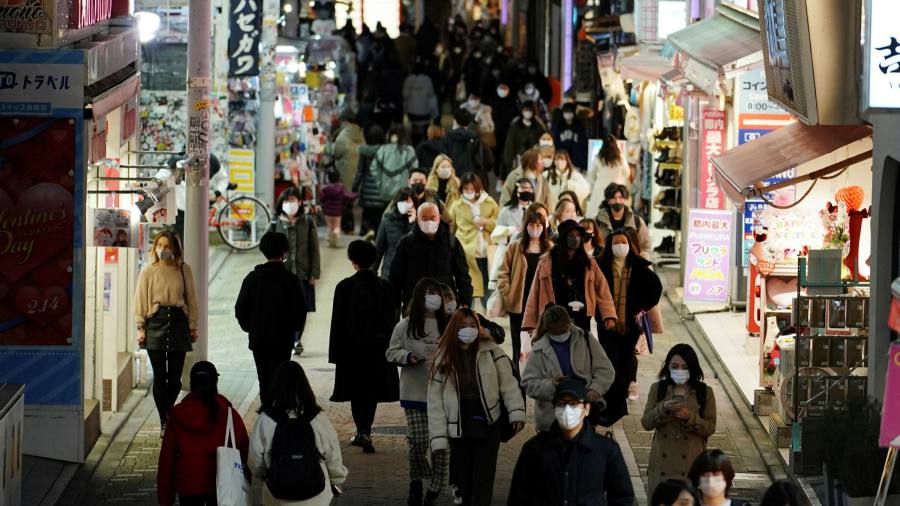[ad_1]
When the coronavirus pandemic began last year, Japan’s suicide prevention specialists were most concerned about vulnerable retirees and the group that historically accounts for the country’s high suicide rate: middle-aged men suffering job loss or business failure.
But instead, according to official data, there was a concerning rise in deaths by suicide among young and middle-aged women. That has prompted a scramble to understand why, amid concerns that Japan’s support systems are failing those who need help.
After years of decline since the economic crises of the 1990s, suicides in Japan rose in 2020 to 20,919 from 20,169 the previous year. But while the suicide rate among men was basically static, among women it rose 15 per cent — from 6,091 to 6,976.
Michiko Ueda, a professor at Waseda University who specialises in suicide prevention, said last year’s figures show a clear break from past trends. “There’s no question that the coronavirus is related to this,†she said. “What’s particularly concerning is that the largest increase is among women, which is not common in Japan.â€
What is less clear is precisely how the pandemic has had such a disproportionate effect on Japanese women.
Suicide rates fell in the early months of 2020, when Japan was under voluntary lockdown, but began to increase from July and then rose suddenly in the autumn. There was little direct correlation between deaths and coronavirus infection rates or the timing of public health restrictions.

“There isn’t such a lot of data so we’re in the realm of interpretation,†said Takanori Hirano, a sociologist at Momoyama Gakuin University in Osaka. As with several colleagues, he pointed first to economic concerns.
“Workplaces where a lot of women work — care, hospitals, retail, services — are those where people have a lot of contact with others, and thus more stress in the pandemic,†he said. “There are also a lot of irregular workers at greater risk of losing their jobs.â€
That has prompted some analysts to question Japan’s economic strategy for Covid-19, which focused on loans and subsidies to keep businesses afloat and only supported their workers indirectly.
“There hasn’t been an increase in suicides among bar and restaurant owners, but rather among their staff,†said Toshio Sakamoto, a professor at Nanzan University in Nagoya.
He cautioned against a simplistic economic reading of the data, however, noting that suicides began to rise around the time the service sector went back to work. There were also big regional variations.
Other possible factors include the stress of working from home, which can lead to increases in domestic violence or relationship difficulties, and the challenge of managing childcare during school closures in the spring.
Ueda also pointed to the changing position of women in Japanese society, with lower rates of marriage and higher rates of full-time work. A generation of men and women who entered the labour market during the economic downturn of the 1990s and 2000s have struggled to find stable jobs.
“There are a lot of single, unmarried women who don’t have a secure economic foundation,†she said. “They are the vulnerable ones — the late-30s, early-40s generation — and there are a lot of structural factors that can’t be changed overnight.â€


Complicating the analysis were the suicides of several female celebrities, which coincided with broader increases. Hana Kimura, a professional wrestler, killed herself in May and the actress Yuko Takeuchi died by suicide in late September.
Ueda said that her research found suicides rose 5-6 per cent after a prominent person kills themselves, and that increase lasts for about 10 days.
“There is an imitation effect,†said Nanzan University’s Sakamoto. “Right after suicides like that, the number of calls to helplines doubles. Takeuchi was 40 and the age range where suicides increased was women in their 40s.â€
Only the government has detailed data about suicides last year, said Ueda, calling for it to conduct an urgent analysis to better understand the rise in female suicides. “We don’t know what is really going on with those who are suffering,†she said.
Most experts agreed that more or better targeted economic support would make a difference. “One big question is why the number of male suicides didn’t rise so much,†said Hirano. “The government response strategy was aimed heavily at workplace subsidies — did that mainly benefit men?â€
Japan may also need to rethink its suicide prevention strategy, said Ueda. Having mainly aimed its helplines and other assistance at reducing the high number of male suicides — with considerable success — the government will need to consider how to reach women as well.
If you have been affected by anything in this story and need help, the TELL Lifeline provides English language support in Japan on 03-5774-0992. In the UK, the Samaritans are on 116 123. The National Suicide Prevention Lifeline in the US is on 1-800-273-8255.
[ad_2]
Source link





